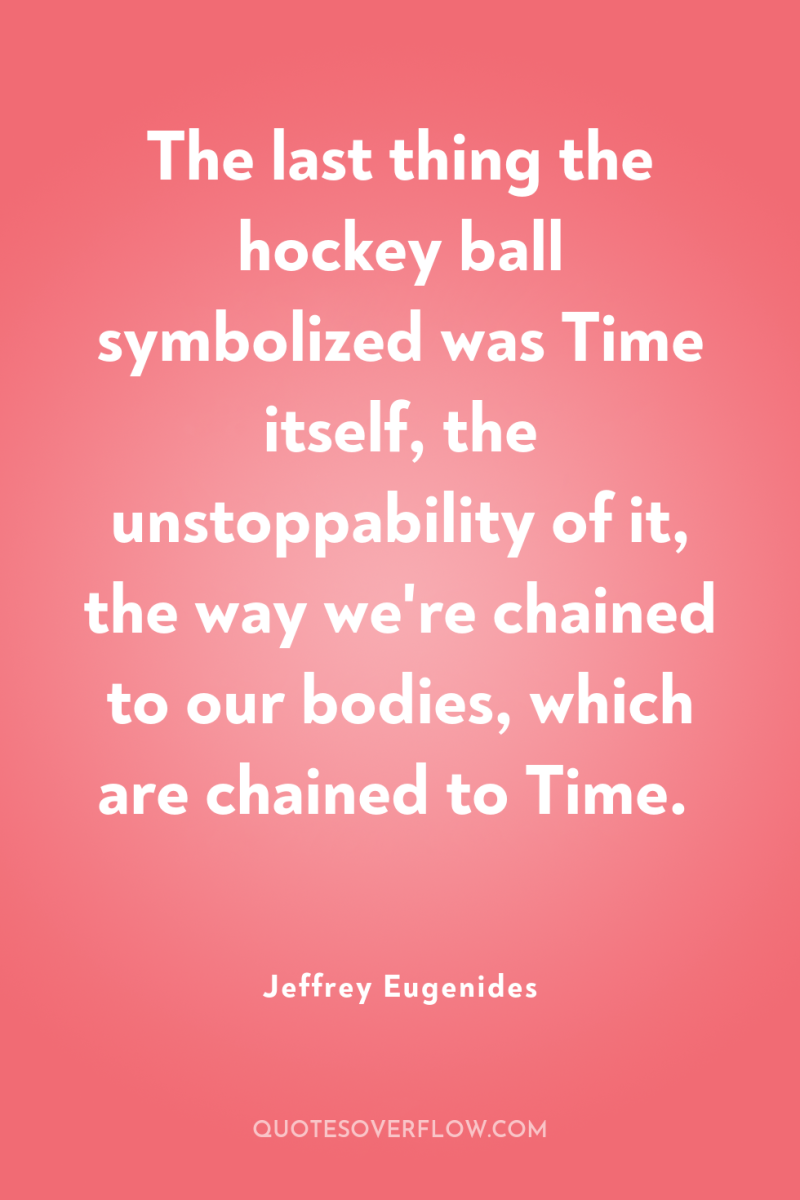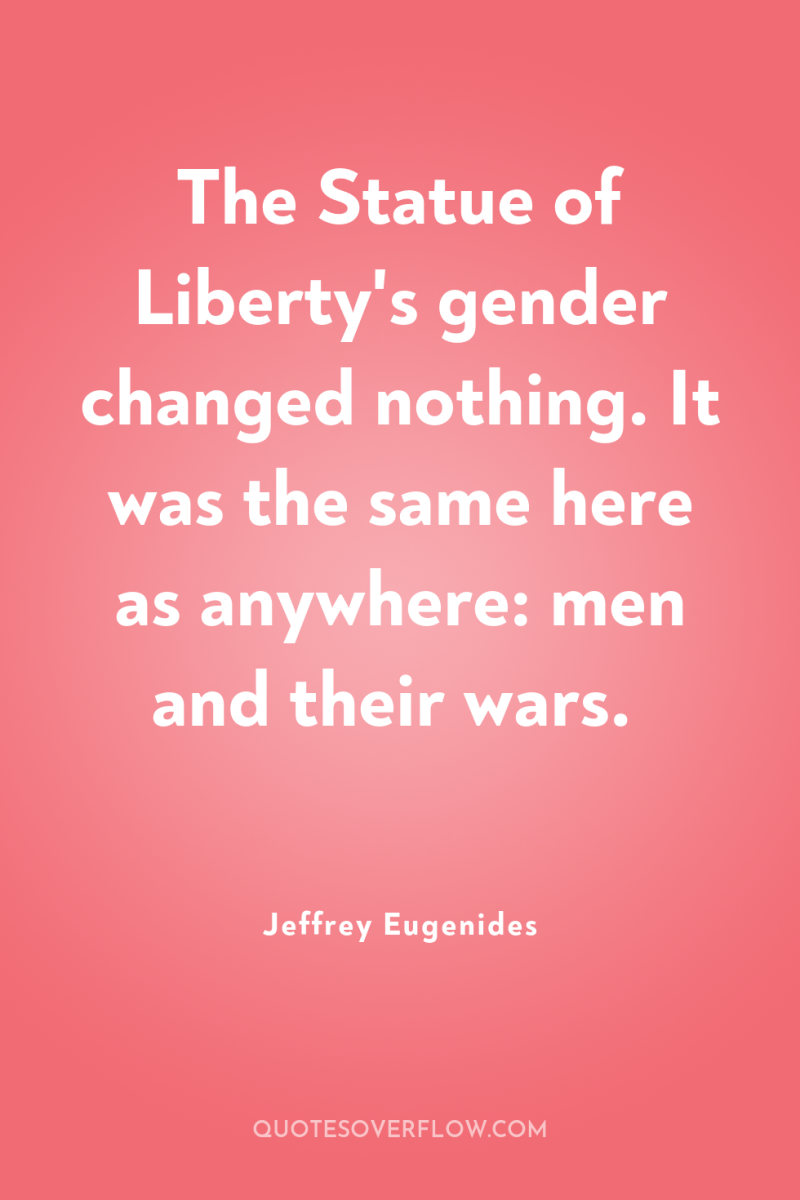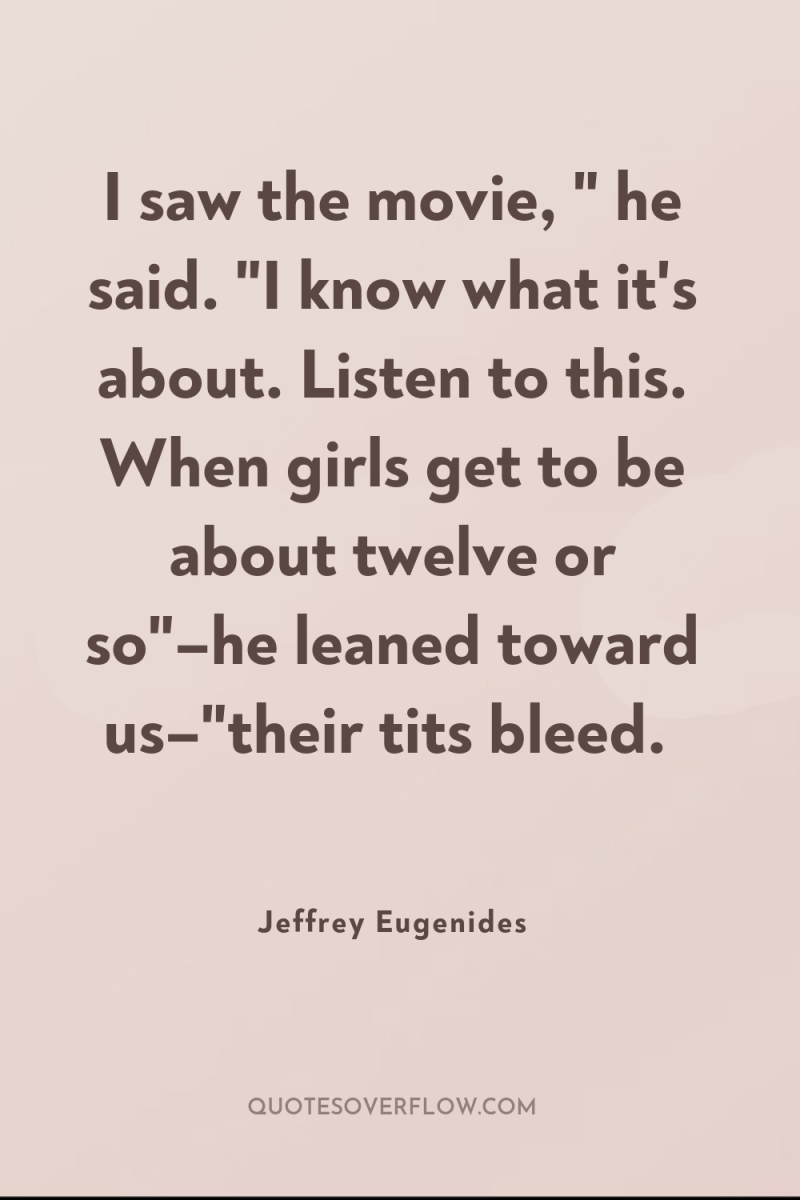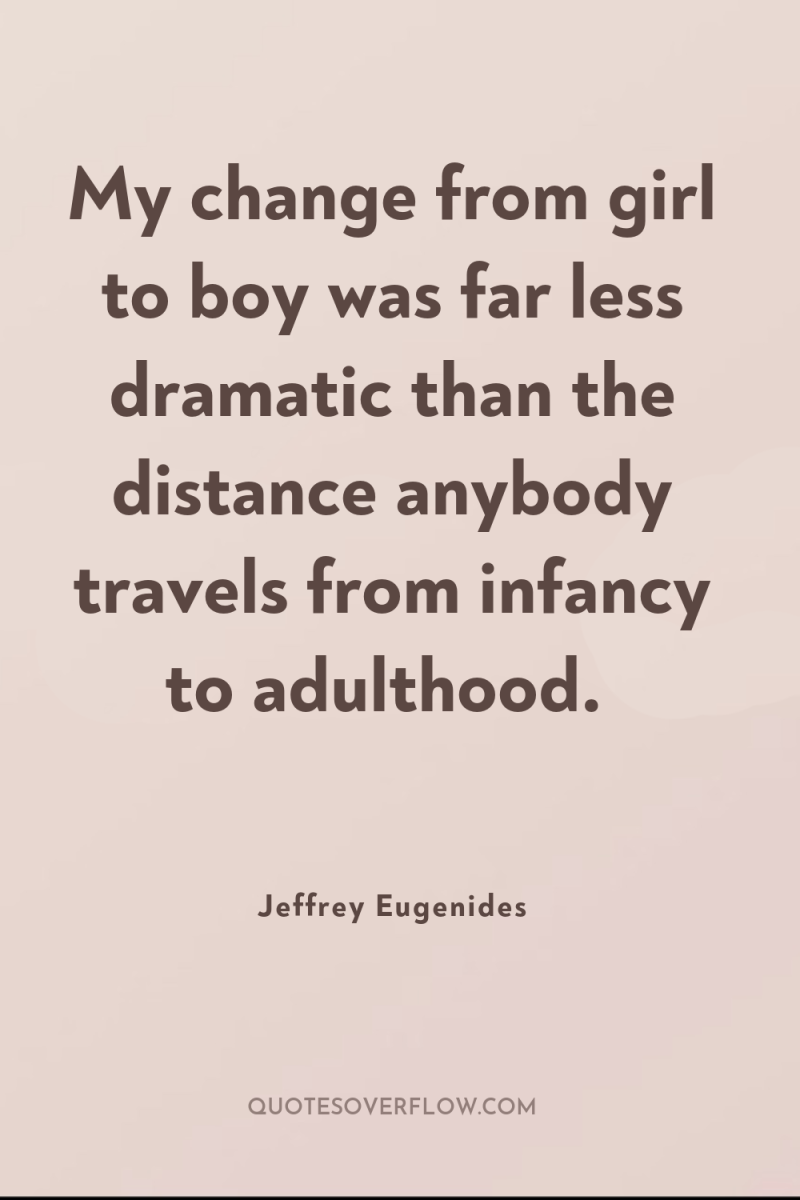1
A love story can never be about full possession. The happy marriage, the requited love, the desire that never dims--these are lucky eventualites but they aren't love stories. Love stories depend on disappointment, on unequal births and feuding families, on matrimonial boredom and at least one cold heart. Love stories, nearly without exception, give love a bad name. We value love not because it's stronger than death but because it's weaker. Say what you want about love: death will finish it. You will not go on loving in the grave, not in any physical way that will at all resemble love as we know it on earth. The perishable nature of love is what gives love its importance in our lives. If it were endless, if it were on tap, love wouldn't hit us the way it does. And we certainly wouldn't write about it. .Jeffrey Eugenides

2
Biology gives you a brain. Life turns it into a mind.Jeffrey Eugenides

3
In the end, it wasn't death that surprised her but the stubbornness of life.Jeffrey Eugenides
4
Yes, you need a passport to prove to the world that you exist. The people at passport control, they cannot look at you and see you are a person. No! They have to look at a little photograph of you. Then they believe you exist.Jeffrey Eugenides

5
It was amazing how it worked: the tiniest bit of truth made credible the greatest lies.Jeffrey Eugenides
6
There was nowhere I could go that wouldn't be you.Jeffrey Eugenides
7
O Earth, lie heavily upon her eyes; Seal her sweet eyes weary of watching Earth;Lie close around her; leave no room for mirth With its harsh laughter, nor for sound of sighs. She hath no questions, she hath no replies.Jeffrey Eugenides

8
She thought a writer should work harder writing a book than she did reading it.Jeffrey Eugenides

9
The last thing the hockey ball symbolized was Time itself, the unstoppability of it, the way we're chained to our bodies, which are chained to Time.Jeffrey Eugenides
10
But maybe they understood more about life than I did. From an early age they knew what little value the world placed in books, and so didn't waste their time with them. Whereas I, even now, persist in believing that these black marks on white paper bear the greatest significance, that if I keep writing, I might be able to catch the rainbow of consciousness in a jar.Jeffrey Eugenides
11
Reading a novel after reading semiotic theory was like jogging empty-handed after jogging with hand weights. What exquisite guilt she felt, wickedly enjoying narrative! Madeleine felt safe with a nineteenth century novel. There were going to be people in it. Something was going to happen to them in a place resembling the world. Then too there were lots of weddings in Wharton and Austen. There were all kinds of irresistible gloomy men.Jeffrey Eugenides
12
Pay no attention to the terrors that visit you in the night. The psyche is at its lowest ebb then, unable to defend itself. The desolation that envelops you feels like truth, but isn't. It's just mental fatigue masquerading as insight.Jeffrey Eugenides

13
The Statue of Liberty's gender changed nothing. It was the same here as anywhere: men and their wars.Jeffrey Eugenides

14
I saw the movie, " he said. "I know what it's about. Listen to this. When girls get to be about twelve or so"–he leaned toward us–"their tits bleed.Jeffrey Eugenides

15
My change from girl to boy was far less dramatic than the distance anybody travels from infancy to adulthood.Jeffrey Eugenides
16
Historical fact: People stopped being people in 1913. That was the year Henry Ford put his cars on rollers and made his workers adopt the speed of the assembly line. At first, workers rebelled. They quit in droves, unable to accustom their bodies to the new pace of the age. Since then, however, the adaptation has been passed down: we've all inherited it to some degree, so that we plug right into joy-sticks and remotes, to repetitive motions of a hundred kinds.Jeffrey Eugenides
17
Virgin suicide What was that she cried? No use in stayin' On this holocaust ride She gave me her cherry She's my virgin suicideJeffrey Eugenides
18
Tessie allowed Milton to press his clarinet to her skin and fill her body with music. At first it only tickled her. But after a while the notes spread deeper into her body. She felt the vibrations penetrate her muscles, pulsing in waves, until they rattled her bones and made her inner organs hum.Jeffrey Eugenides
19
Planning is for the world's great cities, for Paris, London, and Rome, for cities dedicated, at some level, to culture. Detroit, on the other hand, was an American city and therefore dedicated to money, and so design had given way to expediency.Jeffrey Eugenides
20
Judge Woodward envisioned the new Detroit as an urban Arcadia of interlocking hexagons. Each wheel was to be separate yet united. This dream never quite came to be. Planning is for the world's great cities, for Paris, London, and Rome, for cities dedicated, at some level, to culture. Detroit, on the other hand, was an American city and therefore dedicated to money, and so design had given way to expediency.Jeffrey Eugenides
21
I'm not sure, with a grandmother like mine, if you can ever become a true American in the sense of believing that life is about the pursuit of happiness.Jeffrey Eugenides
22
At that moment Mr. Lisbon had the feeling that he didn't know who she was, that children were only strangers you agreed to live with, and he reached out in order to meet her for the first time.Jeffrey Eugenides
23
They had killed themselves over our dying forests, over manatees maimed by propellers as they surfaced to drink from garden hoses; they had killed themselves at the sight of used tires stacked higher than the pyramids; they had killed themselves over the failure to find a love none of us could ever be. In the end, the tortures tearing the Lisbon girls pointed to a simple reasoned refusal to accept the world as it was handed down to them, so full of flaws.Jeffrey Eugenides
24
We realized that the version of the world they rendered for us was not the world they really believed in...Jeffrey Eugenides
25
Mr. Lisbon had the feeling that he didn't know who she was, that children were only strangers you agreed to live with.Jeffrey Eugenides
26
Children learn to speak Male or Female the way they learn to speak English or French.Jeffrey Eugenides
27
We knew the pain of winter rushing up your skirt, and the ache of keeping your knees together in class, and how drab and infuriating it was to jump rope while the boys played baseball. We could never understand why the girls cared so much about being mature, or why they felt compelled to compliment each other...Jeffrey Eugenides
28
College feminists made fun of skyscrapers, saying they were phallic symbols. They said the same thing about space rockets, even though, if you stopped to think about it, rockets were shaped the way they were not because of phallocentrism but because of aerodynamics. Would a vagina-shaped Apollo 11 have made it to the moon? Evolution had created the penis. It was a useful structure for getting certain things done. And if it worked for the pistils of flowers as well as the inseminatory organs of Homo sapiens, whose fault was that but Biology's? But no--anything large or grand in design, any long novel, big sculpture, or towering building, became, in the opinion of the "women" Mitchell knew at college, manifestations of male insecurity about the size of their penises.Jeffrey Eugenides
29
Mr. Lisbon knew his parental and neighborly duty entailed putting the retainer in a Ziploc bag, calling the Kriegers, and telling them their expensive orthodontal device was in safe keeping. Acts like theses -- simple, humane, conscientious, forgiving -- held life together. Only a few days earlier he would have been able to perform them. But now he took the retainer and dropped it in the toiler. He pressed the handle. The retainer, jostled int he surge, disappeared down the porcelain throat, and, when waters abated, floated triumphantly, mockingly, out, Mr. Lisbon waited for the tank to refill and flushed again, but the same thing happened. The replica of the boy's mouth clung to the white slope.Jeffrey Eugenides
30
They thought depression was like bieng 'depressed'. They thought it was like being in a bad mood, only worse. Therefore, they tried to get him to snap out of it.Jeffrey Eugenides
31
Emotions, in my experience, aren't covered by single words. I don't believe in "sadness", "joy", or "regret".Maybe the best proof that the language is patriarchal is that is oversimplifies feeling. I'd like to have at my disposal complicated hybrid emotions.Jeffrey Eugenides
32
Depression is like a bruise that never goes away. A bruise in your mind. You just got to be careful not to touch it where it hurts. It's always there, though.Jeffrey Eugenides
33
He had the feeling that there was something physically behind his eyes, blocking the light.Jeffrey Eugenides
34
He felt as if he were being violently emptied out, as if a big magnet were pulling his blood and fluids down into the earth. He was weeping again, unstoppably, his head like the chandelier in his grandparents’ house in Buffalo, the one that was too high for them to reach and that every time he visited had one fewer bulb alight. His head was an old chandelier, going dark.Jeffrey Eugenides
35
I don't want to ruin your life, " Leonard said in a gentler tone." You're not ruining it."" The drugs just slow the process down. But the end's inevitable. The question is, how to turn this thing off?" He jabbed at his head with his index finger. "It's cutting me up, and I can't turn it off. Madeleine, listen to me. Listen. I'm not going to get better.Jeffrey Eugenides
36
Household objects lost meaning. A bedside clock became a hunk of molded plastic, telling something called time, in a world marking its passage for some reason.Jeffrey Eugenides
37
Desdemona, mourning her parents, was still imprisoned by the past. And so she stood on the mountain, looking down at the emancipated city, and felt cheated by her ability to feel happy by everybody else.Jeffrey Eugenides
38
Often he had the impression that the person answering questions from the scratchy armchair was a dummy he was controlling, that this had been true throughout his life, and that his life had become so involved with operating the dummy that he, the ventriloquist, had ceased to have a personality, becoming just an arm stuffed up the puppet's back.Jeffrey Eugenides
39
There’s a thing they’ve figured out about love. Scientifically. They’ve done studies to find out what keeps couples together. Do you know what it is? It isn’t getting along. Isn’t having money, or children, or a similar outlook on life. It’s just checking in with each other. Doing little kindnesses for each other. At breakfast, you pass the jam. Or, on a trip to New York City, you hold hands for a second in a smelly subway elevator. You ask “How was your day?” and pretend to care. Stuff like that really works.Jeffrey Eugenides
40
Find the Bad Guy means how, when you’re arguing with your spouse, both people are trying to win the argument. Who didn’t close the garage door? Who left the Bigfoot hair clump in the shower drain? What you have to realize, as a couple, is that there is no bad guy. You can’t win an argument when you’re married. Because if you win, your spouse loses, and resents losing, and then you lose, too, pretty much. .Jeffrey Eugenides
41
She lost much of her appetite. At night, an invisible hand kept shaking her awake every few hours. Grief was physiological, a disturbance of the blood. Sometimes a whole minute would pass in nameless dread - the bedside clock ticking, the blue moonlight coating the window like glue - before she`d remember the brutal fact that had caused it.Jeffrey Eugenides
42
Emotions, in my experience, aren't covered by single words. I don't believe in "sadness, " "joy, " or "regret." Maybe the best proof that the language is patriarchal is that it oversimplifies feeling. I'd like to have at my disposal complicated hybrid emotions, Germanic train-car constructions like, say, "the happiness that attends disaster." Or: "the disappointment of sleeping with one's fantasy." I'd like to show how "intimations of mortality brought on by aging family members" connects with "the hatred of mirrors that begins in middle age." I'd like to have a word for "the sadness inspired by failing restaurants" as well as for "the excitement of getting a room with a minibar." I've never had the right words to describe my life, and now that I've entered my story, I need them more than ever.Jeffrey Eugenides
43
As they were walking, a beggar came up, holding his hand out and crying, "Baksheesh! Baksheesh! "Mike kept on going but Mitchell stopped. Digging into his pocket, he pulled out twenty paise and placed it in the beggar's dirty hand. Mike said, "I used to give to beggars when I first came here. But then I realized, it's hopeless. It never stops."" Jesus said you should give to whoever asks you, " Mitchell said." Yeah, well, " Mike said, "obviously Jesus was never in Calcutta.Jeffrey Eugenides
44
Wouldn't it be nice to be done with it? To be done with sex and longing? Mitchell could almost imagine pulling it off, sitting on a bridge at night with the Seine flowing by. He looked up at all the lighted windows along the river's arc. He thought of all the people going to sleep or reading or listening to music, all the lives contained by a great city like this, and, floating up in his mind, rising just above the rooftops, he tried to feel, to vibrate among, all those million tremulous souls. He was sick of craving, of wanting, of hoping, of losing. .Jeffrey Eugenides
45
The girls took into their own hands decisions better left to God. They became too powerful to live among us, too self-concerned, too visionary, too blind.Jeffrey Eugenides
46
We knew that Cecilia had killed herself because she was a misfit, because the beyond called to her, and we knew that her sisters, once abandoned, felt her calling from that place, too.Jeffrey Eugenides
47
On the morning the last Lisbon daughter took her turn at suicide–it was Mary this time, and sleeping pills, like Therese–the two paramedics arrived at the house knowing exactly where the knife drawer was, and the gas oven, and the beam in the basement from which it was possible to tie a rope.Jeffrey Eugenides
48
During a warm winter rain ... the basins of her collarbones collected water.Jeffrey Eugenides
49
When we asked him to sum up his impression of the girls' emotional state at that point, he said, "Buffeted but not broken.Jeffrey Eugenides
50
They made us participate in their own madness, because we couldn't help but retrace their steps, rethink their thoughts, and see that none of them led to us.Jeffrey Eugenides
51
But this is all chasing after the wind. The essence of the suicides consisted not of sadness or mystery but simple selfishness. The girls took into their own hands decisions better left to God. They became too powerful to live among us, too self-concerned, too visionary, too blind. What lingered after them was not life, which always overcomes natural death, but the most trivial list of mundane facts: a clock ticking on a wall, a room dim at noon, and the outrageousness of a human being thinking only of herself.Jeffrey Eugenides
52
Maybe the best proof that the language is patriarchal is that it oversimplifies feeling.Jeffrey Eugenides
53
For our own part, we learned a great deal about the techniques of love, and because we didn't know the words to denote what we saw, we had to make up our own. That was why we spoke of "yodeling in the canyon" and "tying the tube, " of "groaning in the pit, " "slipping the turtle's head, " and "chewing the stinkweed." Years later, when we lost our own virginities, we resorted in our panic to pantomiming Lux's gyrations on the roof so long ago; and even now, if we were to be honest with ourselves, we would have to admit that it is always that pale wraith we make love to, always her feet snagged in the gutter, always her single blooming hand steadying itself against the chimney, no matter what our present lovers' feet and hands are doing.Jeffrey Eugenides
54
Discussing it later, many of us felt we suffered a mental dislocation at that moment, which only grew worse through the course of the remaining deaths. The prevailing symptom of this state was an inability to recall any sound. Truck doors slammed silently; Lux's mouth screamed silently; and the street, the creaking tree limbs, the streetlight clicking different colors, the electric buzz of the pedestrian crossing box - all these usually clamorous voices hushes, or had begun shrieking at a pitch too high for us to hear, though they sent chills up our spines. Sound returned only once Lux had gone. Televisions erupted with canned laughter. Fathers splashed, soaking aching backs.Jeffrey Eugenides
55
I mean, in the end it wasn't up to me. The big things never are. Birth, I mean, and death. And love. And what love bequeaths to use before we're born.Jeffrey Eugenides
56
It's often said that a traumatic experience early in life marks a person forever, pulls her out of line, saying, "Stay there. Don't move.Jeffrey Eugenides
57
This whole country's stolen.Jeffrey Eugenides
58
The more she thought about it, the more Madeleine understood that extreme solitude didn't just describe the way she was feeling about Leonard. It explained how she'd always felt when she was in love. It explained what love was like and, just maybe, what was wrong with it.Jeffrey Eugenides
59
The lover`s discourse was of an extreme solitude. The solitude was extreme because it wasn`t physical. It was extreme because you felt it while in the company of the person you loved. It was extreme because it was in your head, the most solitary of places.Jeffrey Eugenides
60
Given the choice, a yeast cell's ideal state is to be diploid. But if it's in an environment with a lack of nutrients, you know what happens? The diploids break into haploids again. Solitary little haploids. Because, in a crisis, it's easier to survive as a single cell.Jeffrey Eugenides
61
We realized that the version of the world [our parents] rendered for us was not the world they really believed in, and that for all their caretaking and bitching about crabgrass they didn't give a damn about lawns.Jeffrey Eugenides
62
We felt the imprisonment of being a girl, the way it made your mind active and dreamy, and how you ended up knowing which colors went together.Jeffrey Eugenides
63
College wasn't like the real world. In the real world people dropped names based on their renown. In college, people dropped names based on their obscurity.Jeffrey Eugenides
64
In Detroit, in July of 1967, what happened was no less than a guerrilla uprising. The Second American Revolution.Jeffrey Eugenides
65
They didn't exchange a single word. But in the weeks that followed, Trip spent his days wandering the halls, hoping for Lux to appear, the most naked person with clothes on he had ever seen. Even in sensible school shoes, she shuffled as though barefoot, and the baggy apparel Mrs. Lisbon bought for her only increased her appeal, as though after undressing she had put on whatever was handy. In corduroys her thighs rubbed together, buzzing, and there was always at least one untidy marvel to unravel him: an untucked shirttail, a sock with a hole, a ripped seam showing underarm hair. She carted her books from class to class but never opened them. Her pens and pencils were as temporary as Cinderella's broom. When she smiled, her mouth showed too many teeth, but at night Trip Fontaine dreamed of being bitten by each one.Jeffrey Eugenides
66
If they were going to kill you, would they knock?Jeffrey Eugenides
67
This was a characteroloical prelude, but it wasn’t chemical or somatic. It was the anatomy of melancholy, not the anatomy of his brain.Jeffrey Eugenides
68
Even our parents seemed to agree more and more with the television version of things, listening to the reporters' inanities as though they could tell us the truth about our own lives.Jeffrey Eugenides
69
Listening to Leonard, Madeleine felt impoverished by her happy childhood. She never wondered why she acted the way she did, or what effect her parents had had on her personality. Being fortunate had dulled her powers of observation.Jeffrey Eugenides
70
We felt the imprisonment of being a girl, the way it made your mind active and dreamy, and how you ended up knowing which colors went together. We knew that the girls were our twins, that we all existed in space like animals with identical skins, and that they knew everything about us though we couldn’t fathom them at all. We knew, finally, that the girls were really women in disguise, that they understood love and even death, and that our job was merely to create the noise that seemed to fascinate them.Jeffrey Eugenides
71
I understood at those times what I was leaving behind: the solidarity of a shared biology. Women know what it means to have a body. They understand its difficulties and frailties, its glories and pleasures. Men think their bodies are theirs alone. They tend them in private, even in public.Jeffrey Eugenides
72
But as I peeked at my brother's inert body.... I was aware only of what a strange thing it was to be male. Society discriminated against women, no question. But what about the discrimination of being sent war? Which sex was really thought to be expendable.Jeffrey Eugenides
73
In Madeleine's face was a stupidity Mitchell had never seen before. It was the stupidity of all normal people. It was the stupidity of the fortunate and the beautiful, of everybody who got what they wanted in life and so remained unremarkable.Jeffrey Eugenides
74
For the first time ever we sympathized with the President because we saw how wildly our sphere of influence was misrepresented by those in no position to know what was going on.Jeffrey Eugenides
75
According to an ancient Chinese legend, one day in the year 240 B.C., Princess Si Ling-chi was sitting under a mulberry tree when a silkworm cocoon fell into her teacup. When she tried to remove it, she noticed that the cocoon had begun to unravel in the hot liquid. She handed the loose end to her maidservant and told her to walk. The servant went out of the princess's chamber, and into the palace courtyard, and through the palace gates, and out of the Forbidden City, and into the countryside a half mile away before the cocoon ran out. (In the West, this legend would slowly mutate over three millennia, until it became the story of a physicist and an apple. Either way, the meanings are the same: great discoveries, whether of silk or of gravity, are always windfalls. They happen to people loafing under trees.).Jeffrey Eugenides
76
Cecilia had unleashed her blood in the bath, Amy Schraff said, because the ancient Romans had done that when life became unbearable.Jeffrey Eugenides
77
It was always embarrassing when professors assigned their own books. Even Madeleine, who found all the reading hard going, could tell that Zipperstein’s contribution to the field was reformulative and second-tier.Jeffrey Eugenides
78
She'd become an English major for the purest and dullest of reasons: because she loved to read.Jeffrey Eugenides
79
But what humans forget, cells remember. The body, that elephantJeffrey Eugenides
80
A changeableness, too, as if beneath my visible face there was another, having second thoughts.Jeffrey Eugenides